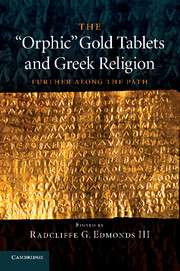Book contents
- Frontmatter
- Contents
- List of contributors
- Acknowledgements
- Note on abberivations
- PART I THE TABLET TEXTS
- PART II TEXTS AND CONTEXTS
- 3 Text and ritual
- 4 Are the “Orphic” gold leaves Orphic?
- 5 “A child of Earth am I and of starry Heaven”
- 6 Common motifs in the “Orphic” B tablets and Egyptian funerary texts
- 7 Center, periphery, or peripheral center
- PART III SEMIOTIC AND NARRATIVE ANALYSES
- Compiled Bibliography
- Index
- Index locorum
- References
5 - “A child of Earth am I and of starry Heaven”
Concerning the anthropology of the Orphic gold tablets
Published online by Cambridge University Press: 04 February 2011
- Frontmatter
- Contents
- List of contributors
- Acknowledgements
- Note on abberivations
- PART I THE TABLET TEXTS
- PART II TEXTS AND CONTEXTS
- 3 Text and ritual
- 4 Are the “Orphic” gold leaves Orphic?
- 5 “A child of Earth am I and of starry Heaven”
- 6 Common motifs in the “Orphic” B tablets and Egyptian funerary texts
- 7 Center, periphery, or peripheral center
- PART III SEMIOTIC AND NARRATIVE ANALYSES
- Compiled Bibliography
- Index
- Index locorum
- References
Summary
It was Walter Burkert who first alerted me to the importance of the Orphic gold tablets many years ago in California – one of the many stimulating ideas for which I have to thank him. Since then, the relevance of these gold tablets for the understanding of Greek religion – those that were known then, as well as those added since – has increased to a degree which would have been unimaginable. The story of the discovery of these texts remains to be written. It is probably too early for a critical, annotated edition, as things are still very much in flux. Instead, we are eagerly awaiting new discoveries. But Ulrich von Wilamowitz-Moellendorff's laconic comment from 1922 nevertheless still holds true: “This is all very strange.” This statement doesn't apply just to the classicist, but just as much to the expert in the New Testament, who finds many points of reference in these gold tablets that haven't yet been thoroughly researched. Burkert himself mentions that “the system of traditional Greek religion is being opened up by mysteries” in these texts, revealing “a deeper level of universal religious devotion.”
THE ESOTERICISM OF THE INSCRIPTIONS
For several reasons, the inscriptions on the gold tablets carry great importance for Greek religion. These inscriptions are among the few first-hand testimonials telling us about the religious experiences and expectations of an ancient cult of mysteries.
- Type
- Chapter
- Information
- The 'Orphic' Gold Tablets and Greek ReligionFurther along the Path, pp. 102 - 119Publisher: Cambridge University PressPrint publication year: 2011
References
- 2
- Cited by

